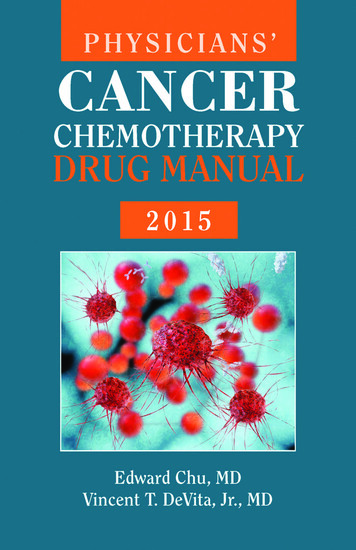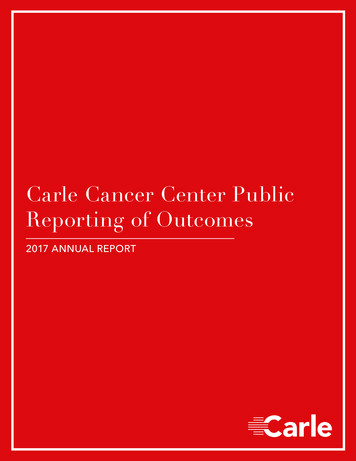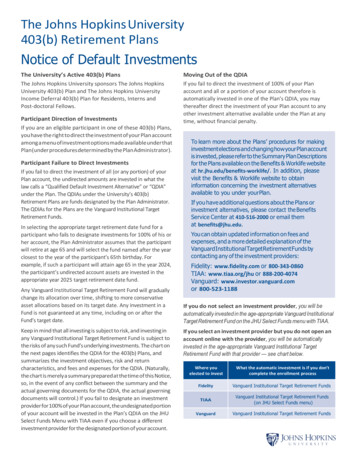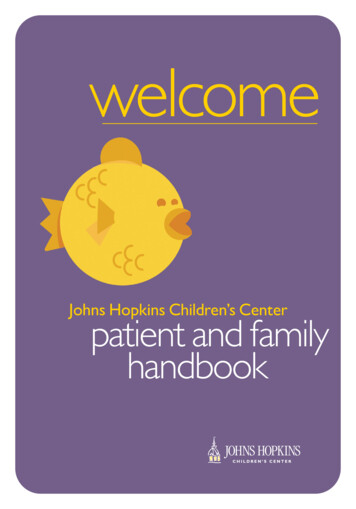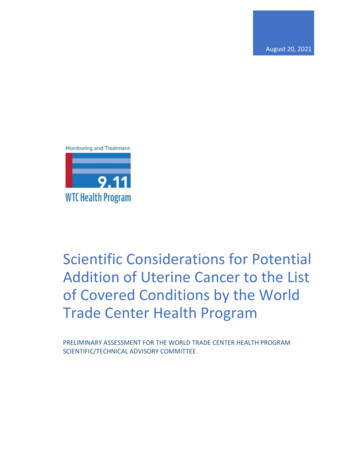
Transcription
inaugural issueTheJohnsHopkinsKimmelThe j o hn s ho pk i n s k i m m e l Can c e r Ce n t e rCancerCenter1COLORECTALC a n c e r Mat te r sThe Newsmagazine of theC o l o r e ct a l C a n c e r R e s e a r c h C e n t e r o f E x c e l l e n c eWinningAgainstColorectalCancer2021- 2022
T h e J o h n s Ho p k i n s K i mmel C a n cer C e n terCOLORECTALC a n ce r Mat te r s2021- 2022The Newsmagazine of theC olorectal C a n cer R e s earc hC e n ter o f E x celle n ceClick on the headline to read the storyMaking HistoryMicromanaging Colon CancerDiscoveryEarlier Screening Being StudiedAdvancing New Therapies ThroughClinical TrialsResearch of Screening for ColorectalCancer Starting at Age 40A Model for ProgressVaccine Approaches forAdvanced Colorectal CancerDiscoveries That Paved the Way forUnprecedented ProgressBuilding a GI Cancer Program in GreaterWashington AreaBeating Colon Cancer During aPandemicJerold Looks Forward to Returningto His Hobbies5x5Advances Colon and Rectal Cancer Surgery Shorter Course of Radiation Therapy -- The 5x5 ApproachUnexpected OpponentBaltimore Orioles’ Trey Mancini DefeatsColon CancerComplex Care for Complex CancersA Young Woman’s Journey with AdvancedColorectal CancerThe Microscopic SocietyLiving Within UsUnique Vaccine Strategies to Help PatientsNoteworthy Kimmel in the Community CombattingColon Cancer Expert Named to National CancerAdvisory Board Web Exclusives on our Cancer Matters BlogInspirational andTransformationalComing in the Next Issue
22021/2022C OLORE C T AL ca ncer m att ersCOLORECTALC a n c e r Mat te r sThe Sidney KimmelComprehensive Cancer Centerat Johns HopkinsPublished byThe Sidney KimmelComprehensive Cancer Centerat Johns HopkinsOffice of Public AffairsBaltimore, MarylandWilliam G. Nelson, M.D., Ph.D.DirectorAmy MoneDirector of Public AffairsValerie Matthews MehlEditor and Sr. Writermehlva@jhmi.eduHoward Korn, Joe Rubino, Stephan KochFeature PhotographyFor additional copies of thispublication or further informationabout the Kimmel Cancer Center,please email mehlva@jhmi.edu.This publication made possible through thegenerosity of Roger Leventer.MSK Partners, Inc.Design and ProductionConnectingOn the WebConnect with gram.com/ hopkinskimmelPodcasts: nsmedicine.orgFOR APPOINTMENTS AND OTHERINFORMATION, CALL 410-955-5222 2021 The Sidney Kimmel Comprehensive Cancer Center at Johns HopkinsON THE COVER:Nilofer Azad, M.D. with Trey Mancini. Dr. Azad threw out thefirst pitch at Oriole Park at Camden Yards.
The j o hn s ho pk i n s k i m m e l Can c e r Ce n t e r3Making HistoryDiscoveries That Paved the Way forUnprecedented Progressof a program can bemeasured by the foundation upon whichit is built, the Kimmel Cancer Center’sColorectal Cancer Research Center ofExcellence and its MultidisciplinaryClinic are titans.The rich history of colon cancerdiscovery at the Johns HopkinsKimmel Cancer Center began in thefields of genetics and epigenetics, hasadvanced into immunology, and nowhas harmonized to bring the conceptof precision medicine into practice.The research has been occurringsimultaneously in laboratoriesthroughout the Johns HopkinsKimmel Cancer Center but remarkablyintersected to create promising new,first-of-their-kind therapies.If the strengthGeneticsIn the 1980s, without the benefit oftoday’s automated gene sequencingtechnology, coloncancer was at the centerof paradigm-shiftingresearch by cancergenetics pioneers BertVogelstein, M.D.,VogelsteinClayton Professor ofOncology; KennethKinzler, Ph.D., BarryFamily Professor ofOncology; and group.They revealed coloncancer as a geneticKinzlerdisease, caused by abuilding series of inherited and acquiredgene alterations. As the genetic errorsaccumulate, cancers originate, growand finally spread. It started with smallclusters of abnormal cells in the lining ofthe colon, advancing to benign tumorsknown as polyps, then to a canceroustumor in the colon and finally pushingthe tumor to its most lethal form, as itspreads outside of the colon to otherparts of the body.Today, these discoveries have ledthis research team, and others acrossthe country, to develop genetic tests,screening diagnostics and targetedtherapies for colon and other cancers.Ushering in the age of molecularbiology, Drs. Vogelstein, Kinzler andhis co-collaborators were among thefirst to apply it to the study of a humandisease, developing the knowledge andtools to look inside the submicroscopicmolecules of the cell to reveal those rare,uncorrected errors in our DNA that putthe cancer process in motion.This science was a cornerstone for thecolorectal cancer research program andits multispecialty clinic. It representeda critical turning point in cancerdiscovery and the opportunity to bringabout unprecedented changes in howcancer treatment could be imaginedand delivered. We now understood thatcolorectal cancer—and other cancers—centered on a delicate balance betweencell growth accelerators known asoncogenes and the cancer-controllinggenes called tumor suppressor genesthat kept them in check. Alterationsto these genes, either inherited oracquired throughout life, disrupted thedelicate balance, giving an advantageto cell growth. More than providing
4C OLOREC T AL ca n cer m att ersan understanding of the causes of thedisease, it began to reveal targets forprevention and treatment.Benjamin Baker, a Johns Hopkinsinternist, was intrigued by thisrevolutionary concept that cancer wascaused by genes gone awry. He helpedKimmel Cancer Center investigatorsform the Bowel Tumor WorkingGroup, which proved to be a turningpoint, bringing together seasonedclinicians and investigators withbright, young scientists to explore thisvisionary, gene-centered hypothesis incolorectal cancer.One by one, they uncovered a seriesof genetic mistakes that revealedhow colorectal cancer started andprogressively became more and moredangerous as these genetic alterationsaccumulated. They identified the genesresponsible for the major forms ofinherited colorectal cancer as well asgenes that initiated the more commonnoninherited form of the disease.Having identified the gene alterationsthat caused inherited colon cancers,such as familial colon cancer and familialadenomatous polyposis (FAP), theydeveloped tests to detect the alterationsand radically changed how thesepatients were managed in the clinic.For the first time, clinicians could knowwhich family members had inheritedcolorectal cancer-causing mutations sothat those at risk could be monitoredclosely for cancer. As important, thetests also revealed family members whodid not have the gene mutations so theycould be spared unnecessary screeningmeasures. It was the first example ofprecision, or individualized, genomebased medicine for patients with typicalforms of cancers.At the time, little was known aboutcolon cancer other than it was anunstable disease that got worse withtime. Dr. Vogelstein credits Dr. Bakerand the formation of the collaborativeworking group for advancing theunderstanding of colon cancer. Theseed money brought together throughthe Bowel Tumor Working Groupproved to be a key turning point.As colon cancer research wasadvancing, these discoveries alsotriggered other investigators at theKimmel Cancer Center and aroundthe country and the world to look forsimilar patterns in other cancers.Researchers looked first to therarest of colon cancers, inherited coloncancer syndromes, for the answers.Though they represented the smallestpercentage of colon cancers, the BowelTumor Working Group team believedthe same genetic underpinnings thatled certain families to be plaguedby an alarmingly high incidence ofcolon cancer—and typically at a muchyounger age—would shed light on coloncancers among the general population.Each person inherits two copies ofevery gene—one from the father andone from the mother. In inheritedcolon cancer syndromes, familymembers are born with only one goodcopy of a gene, giving them a headstart on the colon cancer process. Assubsequent assaults from diet andother environmental carcinogens knockout the one good copy, the cascade ofcellular errors that ultimately results incancer is put in motion.As they looked for genetic errorsamong inherited cancers, Drs.Vogelstein and Kinzler, and pathologistStanley Hamilton,M.D., identified amutation of the APCgene in FAP, a rareinherited syndrome inwhich affected peopleHamiltonget hundreds of benigntumors known asadenomas or polyps intheir colons. Furtherstudies showed thesame mutation to bethe one that jump-startsGiardiellothe cancer process inthe nearly 140,000 people within thegeneral population who are diagnosedwith colon cancer each year.For gastroenterologist and BowelTumor Working Group team memberFrancis Giardiello, M.D., thediscoveries were monumental.“Now that we knew the genes, wecould figure out the pathways theywork through and use them as targetsfor treatment,” says Dr. Giardiello.He was already anticipating the needfor combination therapies to overcomethe complexity of the disease. Hepredicted that therapies that hit justone molecular pathway or cell activitywouldn’t work because the body hasmany systems in place that protect keyfunctions. Like other normal cellularmechanisms, cancer has hijacked theseprotective properties to act as barriersto therapy.“There are multiple pathwaysinvolved in colon cancer, so we have totarget them all, and that means usingmultiple drugs,” says Dr. Giardiello.“Up until 2000, we used one or twodrugs to treat colon cancer, with 5FUbeing the main one. It wasn’t thatgreat, but nobody had a better drug.But, if we use it in combination withother drugs, it could hit more pathwaysand be more effective.”At the same time, experts werediscovering alterations that did theircancer-causing damage by altering thechemical environment of DNA. Thesewere known as epigenetic alterations.EpigeneticsCancer genetic and epigenetic researchhave advanced dramatically in the lastdecade, and with the leading experts inboth disciplines at the Kimmel CancerCenter, investigators have uncovered aconvergence of the two fields. Many ofthe genes mutated in cancer are genesthat regulate epigenetic processes,providing a link between geneticmutations and epigenetic abnormalities.Like a volume control, epigeneticalterations can amplify or dampen aseries of genes, changing the globalexpression pattern and dramaticallyaltering the behavior of cells.These chemically mediated on andoff switches alter the function of geneswithout mutating the DNA, usually byadding chemical groups to the signalingportion of genes or by tightening orrelaxing how the DNA is packaged
The j o hn s ho pk i n s k i m m e l Can c e r Ce n t e rwithin the cell.Like Drs. Vogelstein and Kinzlerin cancer genetics, Kimmel CancerCenter researcher Stephen Baylin,M.D., was a pioneer in the field ofcancer epigeneticsresearch.He revealed thatchromatin, a complexcombination of proteins,mainly histones,Baylinis responsible forcompressing the six feet of DNA tofit inside a cell. A loose chromatin,he found, resulted in normal geneexpression, but add methylation tothe mix, and histones hold the DNAtogether tightly and interfere with thegene expression.This tightened chromatin, Dr.Baylin and team found, can keep genes,including tumor suppressor genes, ina constant state of non-expression.It can cause cancer cells to behave ina primitive, embryoniclike manner.Unlike normal embryonic cells, whichreceive and respond to signals thattell them to stop making new cells,epigenetically altered cancer cells seemto maintain their ability to replicate,renew and divide.Scientists do not know whatprompts the cancer-promoting changesin chromatin structure. They suspectit may be a repair mechanism engagedin response to cell injury, such aschronic inflammation. Althoughthe cause is uncertain, Dr. Baylin’sresearch revealed that combining ademethylating drug with a histoneblocking drug (HDAC inhibitor)loosens the chromatin and restoressome gene expression.The first clinical study of thisepigenetic-targeted therapy includedpatients with advanced colon cancers.Colorectal Cancer Research Centerof Excellence Director Nilofer Azad,M.D., helped lead these clinical studies.The ability of the epigenetic therapy toreturn suppressor gene function to amore normal state primes cancer cellsto respond better to anticancer drugsand potentially immunotherapies, saysDr. Azad. She worked with the Baylinteam to identify epigenetic biomarkersthat could predict sensitivity to certainchemotherapy drugs.“Many drugs have been tested andlooked inactive when they are givenbroadly to large groups of patients,but we are finding that there aresubsets of patients who may benefit,and we can use epigenetic markersto identify these patients,” says Dr.Azad. “Drug treatments are limitedfor colorectal cancer patients, andthis is one approach that could helpus significantly expand options forpatients.”ImmunologyWhen it comes to cancer immunology,Kimmel Cancer Center researcherswere once again positioned to makegroundbreaking discoveries, includingone that was centered on colorectalcancer.At the Bloomberg KimmelInstitute for CancerImmunotherapy,Director Drew Pardoll,M.D., Ph.D., and teamwere studying the PD-1immune checkpointPardolland a promising newimmunotherapy that inhibited thecheckpoint, causing the immunesystem to attack a certain subset ofcancers. Lung cancers and melanomaswere the best responders in the firstclinical studies. A single colon cancerpatient responded to the treatment.In an effort to solve the mysteryof the single colon cancer responder,Dr. Pardoll sought the advice of theVogelstein/Kinzler group, along withtheir clinical translation leader LuisDiaz, M.D.Peeking his head around the doorduring a lab meeting, Dr. Pardollasked the group, “Do you have anyidea why this one colon cancerpatient responded to anti-PD-1immunotherapy when the others didnot?”Its conclusion had paradigm-shiftingresults for colon cancer and many5other cancers. It centered on a 1993research discovery. The group asked,“What is the patient’s mismatch repairstatus?”Some 20 years earlier, Drs.Vogelstein, Kinzler and team identifieda genetic alteration linked to Lynchsyndrome, a hereditary form of coloncancer that is caused by mistakes inmismatch repair genes.The job of mismatch repair is tocorrect copying errors that occur whenDNA replicates and cells divide. Peoplewho inherit a defective copy of the geneexperience high rates of mutationsand are at increased risk of developingcolon cancer. Colon cancers in patientswith mismatch repair deficiency havemore than 1,000 mutations, whilethose without typically have less than100.The signals sent out by the mutatedgenes were an announcement to theimmune system that they don’t belong.In this case, the cause of the cancer—the mismatch repair mutation—is alsoits Achilles’ heel. The more mutationsthat exist in the cancer, the louder thesignal and the more likely it is that theimmune system will take notice.In fact, the single colon cancerresponder had Lynch syndrome.At the time the Vogelstein/Kinzlergroup discovered the mismatch repairmutation, it also developed a test for itso those affected could be screened andtheir colon cancers detected in an earlyand curable stage.Dr. Diaz, workingwith gastrointestinalcancer immunologyexpert Dung Le,M.D., saw a clinicalLeopportunity. Thetest was used to confirm the singleresponder had mismatch repairalterations, and Dr. Le used it toidentify other colon cancer patientswith the same genetic defect to begina clinical study of the benefit ofimmunotherapy.She led a three-year clinical trial,funded by Swim Across America,the Lustgarten Foundation, the Skip
6C OLOREC T AL ca n cer m att ersDiscoveryAdvancing New TherapiesThrough Clinical TrialsExtending the promise of new cancer drugs,and particularly immunotherapies, to morecolorectal cancer patients is a focus of clinicaltrials at the Colorectal Cancer Research Center ofExcellence, says Nilofer Azad, M.D., who directsthe Developmental Therapeutics Program at theKimmel Cancer Center.“There are multiple clinical trials combiningimmunotherapy drugs for patients with metastaticcolorectal cancer,” says Dr. Azad, who is exploringepigenetic drug and immunotherapy drugcombinations. “Epigenetic drugs change the waycancer genes are expressed, and we can use thatchange to target the immune system.”Laboratory researcher Franck Housseau, Ph.D.,a colorectal cancer and immunotherapy expert,is collaborating with colon cancer clinical expertDung Le, M.D., to identify new targets on thesurface of colon cancer cells that could help makethe immune system recognize and destroy coloncancer in more patients.“We have a major effort to move new drugs intopatients,” says Dr. Azad, who is also a principalinvestigator on the Stand Up To Cancer ColorectalCancer Dream Team and leads its gastrointestinalcancer efforts.She is also a member of the National CancerInstitute Molecular Analysis for Therapy Choiceworking group, the largest clinical trial in theUnited States to study precision medicine—individualized therapies based on the uniquegenetic characteristic of a patient’s cancer.
The j o hn s ho pk i n s k i m m e l Can c e r Ce n t e r7Viragh Foundation, the Banyan GateFoundation, the CommonwealthFund and the Sol Goldman PancreaticCancer Research Center. The trialincluded 86 patients with colorectaland 11 other kinds of cancer who hadthe mismatch repair genetic defect.Dr. Le found that half of the patientsresponded to an immunotherapy drugcalled pembrolizumab.“Our study results led to a newstandard of care that includes mismatchrepair deficiency testing to help identifya wider group of patients who havefailed other therapies but may benefitfrom immunotherapy drugs,” says Dr.Le. “For other treatments, includingchemotherapy, the changing tumorbiology due to accumulating mutationscauses treatments to stop working, butit seems to make immune therapieswork better.”Her study helped set the stagefor the historic 2017 U.S. Food andDrug Administration approval ofthe anti-PD-1 checkpoint blockerpembrolizumab for all cancers thathave mismatch repair deficiency. Itwas the first-ever drug approval nottied to a specific cancer type. In 2020, anew FDA approval permitted first-linetreatment of patients with inoperable,advanced colorectal cancer that hasspread to other places of the bodyand has mismatch repair deficiency.It marked the first immunotherapyapproved for this patient population asa first-line treatment that can be givento patients without chemotherapy.“It is rare to get a response incolon cancer patients who have notresponded to other standard therapies,and most of them had just monthsto live,” says Dr. Le. “It has been agame changer in the treatment of thiscancer.”The interaction among all researchand clinical specialties that led tothis breakthrough discovery is thehallmark of the Johns HopkinsColorectal Cancer Research Center ofExcellence’s Multidisciplinary Clinic.The Multi-D Clinic—as it isreferred to by care providers andpatients alike—melds multiplespecialties, precision treatmentsdesigned specifically for the uniquecharacteristics of each patient’scancer and the innovative researchthat revolutionized progress againstcolorectal cancer.As rates of colorectal cancerincrease, including among youngeradults, Dr. Azad looks for more andcreative ways to attack this cancer.Colorectal cancer is the third mostcommon form of cancer in the worldand the second leading cancer killerin the United States. Incidence isincreasing, and this multifacetedapproach, harnessing the mostadvanced research and patient care,will save lives, she says.She calls for a greater emphasison education and prevention,accelerated biomedical research, andthe exploration of new treatments,particularly combination therapies,epigenetic therapies immunotherapies,and an enhanced focus on quality oflife and long-term survivorship.“We never forget the science, andthat puts us at the forefront of clinicalbreakthroughs,” she says. “We haveleading genetics, epigenetics andimmunology researchers working sideby side with clinicians to bring thesenext advances to fruition.”That edge cannot be overstated.“I can’t think of another place likethis, with this level of interaction” saysDr. Vogelstein. “You can’t manufacturethat kind of environment. It has to bebuilt from the ground up, and we’revery fortunate to have it here.”Milestones That Matter Advances in precision medicine, Tumor samples of all stages of Genomic discoveries revealed the genetic mutations that causecolorectal cancer initiation andprogression.Epigenetic research and emergingtherapies provide the promise ofmanipulating cancer cells so they areeasier to treat and less able to evadetreatment.Immunotherapies provide longlasting control of specific colorectalcancers, including some advancedcancers.Better detection methods, includingcirculating tumor cell technologyknown as liquid biopsy, detect smallclusters of cancer cells years beforethey are visible on CT or other scans.The MultidisciplinaryDifferenceincluding identification of criticalcancer signatures, allow providersto customize treatment for individualpatients.Advances On the HorizonExpanding survivorship servicesfor long-term care of patients. A colorectal cancer tissue bank linkedto clinical outcomes will include tissueand blood samples of patients treatedin the Colorectal Cancer ResearchCenter of Excellence’s MultidisciplinaryClinic. Blood samples obtained overtime will monitor effects of therapy andbegin to link detailed clinical outcomesto specific genetic and epigeneticcharacteristics.human colorectal cancer tumorsimplanted in mouse models, calledxenografts, should provide a betterunderstanding of how colorectalcancer develops and spreads. Thesemodels can also be used to test novelcancer therapies against individualpatients’ tumors. Understanding the role of epigenetictherapy as primary therapies to primethe immune system and to reversechemotherapy resistance. Sequencing the genome andepigenome of primary and metastaticcolorectal tumors. Optimizing the sequencing of surgery,chemotherapy and radiation therapyto cure metastatic colorectal cancers.
8C OLORE C T AL ca ncer m att ersA Model for ProgressBuilding a GI Cancer Program inthe Greater Washington AreaGastrointestinal cancer expertValerie Lee, M.D., is building acolorectal, pancreaticand gastric cancersprogram at SibleyMemorial Hospital inWashington, D.C.Among her goalsLeeis expanding thenumber of clinical trials availableto cancer patients. She is excitedabout collaborating with experts inthe Johns Hopkins Proton TherapyCenter, located at Sibley, to explorethe role of proton therapy, particularlyhow it could be used to treat livermetastases—cancer that spreads fromthe colon, pancreas or other organ tothe liver.Dr. Lee is involved in a broadrange of clinical research aimed atgetting more patients to potentiallycurative surgery and at preventingcancer recurrence and spread. She isexploring treatment combinations,including immune checkpointblockers, drugs that remove restraintscancer cells place on the immunesystem; cancer vaccines, whichdraw cancer-fighting T cells to thecancer; and radiation therapy to goafter cancer cells directly and helpaugment the immune response.She is also studying the benefits ofimmunotherapy and radiation therapyafter surgery to prevent cancers fromcoming back.Radiation therapy, she says,“cleans up cancer cells that may beat the surgical borders and also is acreative way to release neoantigensto stimulate the immune system.”Neoantigens are signals given off bycancer cells that alert the immunesystem to their presence.Dr. Lee is hopeful about thepromise of immunotherapies, whichhave worked incredibly well for asubset of patients. “We just need tobetter understand how to turn on theswitch to expand this benefit to morepatients,” she says. Dr. Lee’s clinicalresearch will reveal obstacles to theimmune response, including what cellsin the environment of tumors, calledthe microenvironment,are interfering with theimmune system’s abilityto recognize and attack.Ashwani Rajput,M.D., director ofRajputthe Kimmel CancerCenter for the national capital region,is leading a study looking at howimmunosuppressive cells in the tumormicroenvironment help tumor cells toescape the immune system.“Due to the intricate natureof the tumor microenvironmentand the interplay of immunityand tumor cells, our knowledgeof how immunosuppression leadsto cancer cells escaping detectionby the immune system remainslimited,” says Dr. Rajput. “Althoughsome cells and signaling pathwaysindirectly promote the initiationand progression of tumors, othersmay act as immune activators toenhance immunity against tumorcells.” Better understanding thetumor microenvironment, he says,will provide useful information tounderstand immunosuppressionin colorectal cancers and to helpdetermine the most comprehensive,promising treatment plan.“If we can understand the factorsthat lead to successful survival ratesand the mechanisms of how thesetumors evade naturalimmune responses,we can achieve betteroutcomes and learn tofurther enhance theimmune system to fightPishvaiantumors,” he says.Michael Pishvaian, M.D.,Ph.D., director of gastrointestinal,developmental therapeutics and clinicalresearch programs for the JohnsHopkins Kimmel Cancer Center in thenational capital region, agrees. Overthe past decade Johns Hopkins has ledthe way in the field of immunotherapyfor different cancers, includingcolorectal, and continues to expand itsknowledge of how the immune system
The j o hn s ho pk i n s k i m m e l Can c e r Ce n t e rcan be used to fight cancers.at patients previously treated, genetic“For colorectal cancer, there hasand molecular markers emerged thatalways been a standard algorithm formay be useful for assessing risk.treatment. Twenty percent have stageHereditary risk factors, such as4 cancer by the time it is discovered,familial adenomatousand by then it has spread,” says Dr.polyposis (FAP) orPishvaian. “We can help them livehereditary nonpolyposislonger and hopefully be cured throughcolorectal cancernew novel approaches to care, but(HNPCC or Lynchto do this, we need to depend onsyndrome), play anCroogexperimental therapies.”important role, andHe says Johns Hopkins has onepeople with theseof the premier precision medicinerisk factors shouldprograms in the country, with manybe screened early.clinical trials focused on patients andHowever, Dr. Leetheir unique biomarkers, so patientssays, there are othercan be offered several therapy optionsnonhereditary causesChungtailored to their specific cancers.that must be explored.“Patients can be hesitant about“Colon cancer has been thought ofparticipating in a trial, but for some,as one disease that comes from polypsit is their best hope for a cure,” hethrough the mutation mechanism,says. “Many of our patients are stillbut that’s not always the case,” shedoing well 10 years or more followingsays. Identifying the molecular profilea trial.” Dr. Pishvaian notesof a tumor may help determine ifthat 30 years ago, a patienta patient will respond to adiagnosed with colonparticular therapy or wouldcancer had months,be a good candidate for aJohns Hopkinsnot years, to live.clinical trial.has one of the premier“Now, we areDrs. Lee, Rajput andprecision medicineable to turn thisPishvaian are joined byprograms in the country,diagnosis into asurgeons Kelly Lafaro,offering several therapychronic disease thatM.D., and Hanieeoptions tailored tocan be manageable,Chung, M.D.; Martinspecific cancers.giving patients soPaul, M.D., regionalmuch hope.”director of minimallyDespite the promiseinvasive surgery; radiationof new therapies, Dr. Leeoncologist Victoria Croog,says, screening, may be the bestM.D.; nurse practitioner Kaitlinweapon against colorectal cancer.Lockhart; nurse navigators; socialCatching precancerous polyps orworkers; interventional radiologists;tumors at their earliest stage willgastroenterologists; pathologists; andbenefit patients in their care andpalliative medicineoutcomes. She explains that dataexperts in buildinghave recently shown that colorectalservices and bringingcancer has gone down slightly inmultispecialty therapythose over 50 but has risen in youngerand patient-tailoredpatients. Experts are evaluating theprecision medicine toLockhartbenefits of lowering the recommendedthe area.screening age (see story on p.22). For“We have great collegiality amongexample, the American Cancer Societyall of the specialties. We all worknow recommends colorectal cancertogether. Every expert has a voice,”screening beginning at age 45 insteadsays Dr. Lee. “It is a model forof age 50. Dr. Lee noted that recently,progress, and there is a lot coming ourbased on a small study looking backway soon.”9Beating Colon CancerDuring a PandemicJerold says he was feeling fine. Then,during a routine screening colonoscopyin early January 2020, his doctor foundan abnormal polyp that turned out tobe stage 3 colon cancer. Specialists atthe Johns Hopkins Kimmel CancerCenter at Sibley Memorial Hospital inWashington, D.C., fast-tracked his caseand managed his care mostly virtuallyduring the COVID-19 pandemic. Now,he’s looking forward to ringing a bell atthe hospital for patients who completedcancer treatment and returning to hisfavorite hobbies.After the colonoscopy, Jerold’s doctortold him not to worry and referred himto Sibley, where he met with surgeonMartin Paul, M.D.“I was pretty scared, but he explainedto me what the process was,” saysJerold, 62, of Silver Spring, Maryland.“I had been totally in the dark. I’m thetype of guywho basicallystayed awayfrom doctorsand hospitals.I hate takingmedicine, evenaspirin.”Dr. Paulordered somepreoperativetests and scheduled surgery for Jan. 23.“They treated me really well. I mean,eve
tools to look inside the submicroscopic molecules of the cell to reveal those rare, uncorrected errors in our DNA that put the cancer process in motion. This science was a cornerstone for the colorectal cancer research program and its multispecialty clinic. It represented a critical turning point in cancer discovery and the opportunity to bring
